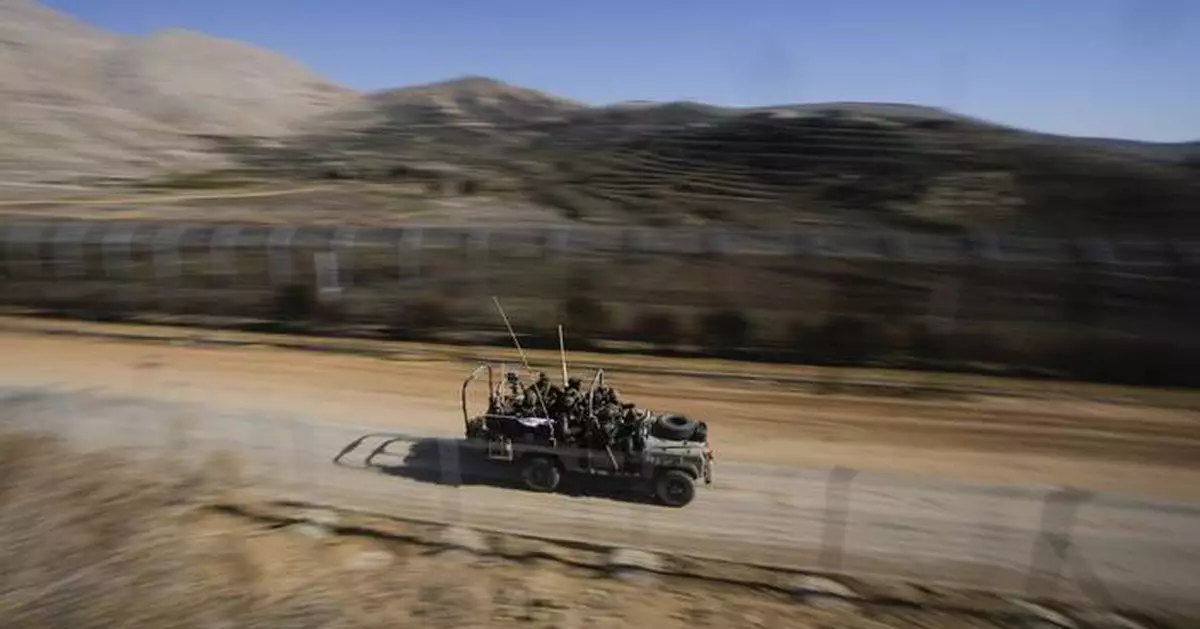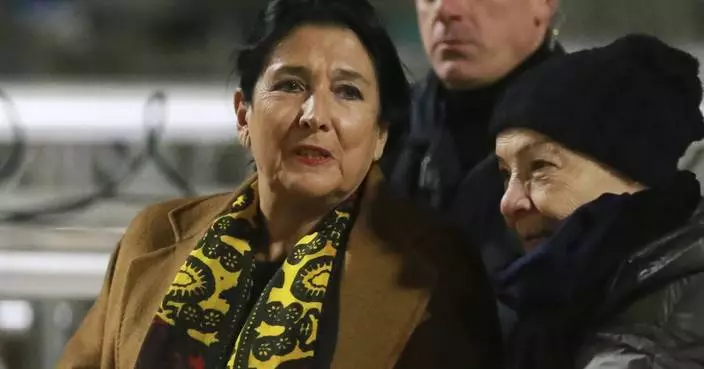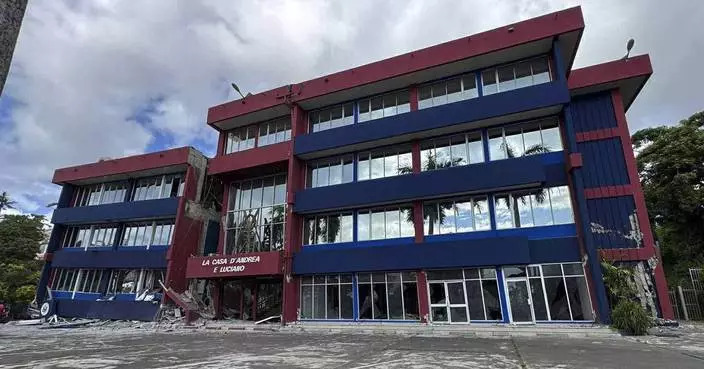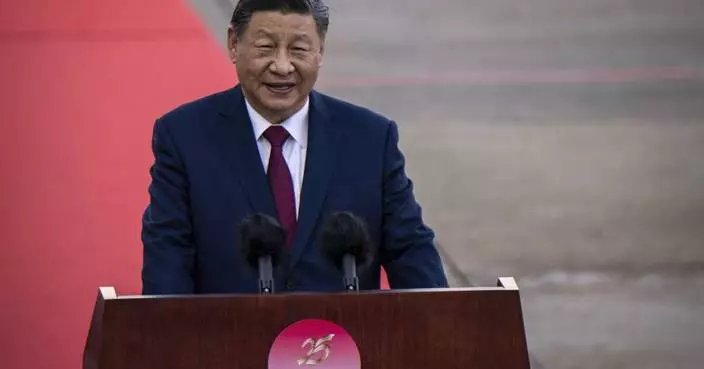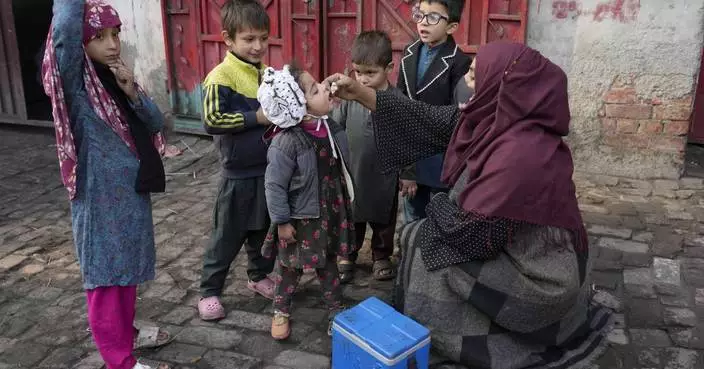JERUSALEM (AP) — Prime Minister Benjamin Netanyahu said Tuesday that Israeli forces will stay in a buffer zone on the Syrian border, seized after the ouster of Syria's President Bashar Assad, until another arrangement is in place “that ensures Israel's security.”
Netanyahu made the comments from the summit of Mount Hermon — the highest peak in the area — inside Syria, about 10 kilometers (6 miles) from the border with the Israel-held Golan Heights.
Click to Gallery
Israel's Prime Minister Benjamin Netanyahu, left, visits Israeli forces in a buffer zone inside Syria, Tuesday, Dec. 17, 2024. (Israel Government Press Office via AP)
Smoke rises from a controlled explosion inside the buffer zone near the so-called Alpha Line that separates the Israeli-controlled Golan Heights from Syria, in Majdal Shams, Tuesday, Dec. 17, 2024. (AP Photo/Matias Delacroix)
An Israeli Air Force Black Hawk helicopter flies over Mount Hermon, near the so-called Alpha Line that separates the Israeli-controlled Golan Heights from Syria, viewed from the town of Majdal Shams, Tuesday, Dec. 17, 2024. (AP Photo/Matias Delacroix)
An Israeli Air Force Black Hawk helicopter flies over Mount Hermon near the so-called Alpha Line that separates the Israeli-controlled Golan Heights from Syria, viewed from the town of Majdal Shams, Tuesday, Dec. 17, 2024. (AP Photo/Matias Delacroix)
Israeli soldiers clean along the so-called Alpha Line that separates the Israeli-controlled Golan Heights from Syria, in the town of Majdal Shams, Tuesday, Dec. 17, 2024. (AP Photo/Matias Delacroix)
Israeli soldiers stand next to armoured vehicles after crossing the security fence, near the so-called Alpha Line that separates the Israeli-controlled Golan Heights from Syria, in the town of Majdal Shams, Tuesday, Dec. 17, 2024. (AP Photo/Matias Delacroix)
Israeli Prime Minister Benjamin Netanyahu attends his trial on corruption charges at the district court in Tel Aviv, Israel, Monday, Dec. 16, 2024. (Stoyan Nenov/Pool Photo via AP)
Israeli soldiers stand on an armoured vehicle after crossing the security fence along the so-called Alpha Line that separates the Israeli-controlled Golan Heights from Syria, in the town of Majdal Shams, Tuesday, Dec. 17, 2024. (AP Photo/Matias Delacroix)
It appeared to be the first time a sitting Israeli leader had set foot that far into Syria. Netanyahu said he had been on the same mountaintop 53 years ago as a soldier, but the summit’s importance to Israel’s security has only increased given recent events.
Israel seized a swath of southern Syria along the border with the Israeli-annexed Golan Heights days after Assad was ousted by rebels last week.
Israel’s capture of the buffer zone, a roughly 400-square-kilometer (155-square-mile) demilitarized area in Syrian territory, has sparked condemnation, with critics accusing Israel of violating a 1974 ceasefire and possibly exploiting the chaos in Syria in the wake of Assad's ouster to make a land grab.
“We will stay ... until another arrangement is found that ensures Israel’s security,” said Netanyahu who had traveled to the buffer zone on Tuesday with Defense Minister Israel Katz.
Katz said he instructed the Israeli military to quickly establish a presence, including fortifications, in anticipation of what could be an extended stay in the area. “The summit of the Hermon is the eyes of the state of Israel to identify our enemies who are nearby and far away,” he said.
An Israeli military official, who spoke on condition of anonymity in line with military regulations, said there is no plan to evacuate the Syrians living in villages within the buffer zone.
The buffer zone between Syria and the Israeli-controlled Golan Heights was created by the U.N. after the 1973 Mideast war. A U.N. force of about 1,100 troops had patrolled the area since then.
A U.N. spokesman said Tuesday that the advance of Israeli troops, however long it lasts, violates the deal that set up the buffer zone.
That agreement “needs to be respected, and occupation is occupation, whether it lasts a week, a month or a year, it remains occupation,” spokesman Stephane Dujarric said.
There was no immediate comment from Hayat Tahrir al-Sham, the insurgent group that led the ouster of Assad, or from Arab states.
Israel still controls the Golan Heights, which it captured from Syria during the 1967 Mideast war and later annexed — a move not recognized by most of the international community. Mount Hermon's summit is divided between the Israeli-annexed Golan Heights, Lebanon, and Syria. Only the United States recognizes Israel’s control of the Golan Heights.
With Assad gone, a top U.N. official said Tuesday that militant leaders who have taken over Syria have committed to “an ambitious scaling-up of vital humanitarian support” for millions in desperate need of food and other aid.
The leader of the insurgent HTS — Ahmad al-Sharaa, formerly known as Mohammed al-Golani — and the country's caretaker prime minister, Mohammed al-Bashir, pledged to support the movement of aid from Turkey, Lebanon, Jordan and other neighboring countries “for as long as humanitarian operations are required," said Tom Fletcher.
Fletcher, who heads the the U.N. Office for the Coordination of Humanitarian Affairs, known as OCHA, spoke to the U.N. Security Council members from Damascus via a video link.
Germany said Tuesday that its diplomats had also met with insurgent leaders to discuss Syria's political transition and “our expectations regarding the protection of minorities and women’s rights.”
German officials, who have noted the rebel group's history of links to al-Qaida, said they will measure the group and the new government based on its actions. The United States has previously said that its officials have been in direct contact with HTS insurgents who ousted Assad.
Also Tuesday, U.S.-backed and Kurdish-led Syrian Democratic Forces proposed that the Kurdish-majority town of Kobani in northern Syria become a demilitarized zone, and that there be a “redistribution of security forces under American supervision and presence.”
Turkey, which backs the Syrian insurgents who toppled Assad, is also battling the Syrian Kurdish militia, considering it a terror group allied with the Kurdish insurgency within its own borders.
Syrian Kurdish forces were a key U.S. ally in the fight against the extremist Islamic State group.
In other developments, bodies of more than 30 Syrians who vanished under Assad's rule were uncovered in a mass grave on Monday. Forensic teams and rebels worked together to unearth the remains in the village of Izraa, north of the city of Daraa, as families of the missing stood by.
The relatives said they had initially hoped to find their loved ones in prison.
“But we didn’t find anyone and it broke our hearts. They were burned alive here after being doused in fuel,” said Mohammad Ghazaleh, who was waiting at the mass grave site.
Some of the bodies recovered showed evidence that they had been shot in the head or burned, said Moussa Al-Zouebi, head of Izraa’s health directorate.
Syria's new authorities have set up a hotline for reporting missing persons and secret detention sites.
In the Syrian capital of Damascus, Qatar officially reopened its embassy on Tuesday — nearly 13 years after it severed diplomatic relations with Assad's government.
Qatar had reaffirmed its “categorical rejection of the regime’s repressive policies against the Syrian people” in a statement earlier. Most foreign embassies in Syria have been shut down since after the country’s civil war erupted in 2011.
The French Embassy in Damascus raised its flag Tuesday in a “symbolic gesture” to show support for the Syrian people during the transition. It's reopening is pending ongoing evaluation of political and security conditions, French Foreign Minister French Foreign Minister Jean-Noël Barrot said.
The Turkish Embassy in Damascus also recently reopened.
Associated Press writer Edith M. Lederer at the United Nations and Omar Akour in Izraa, Syria, contributed to this report.
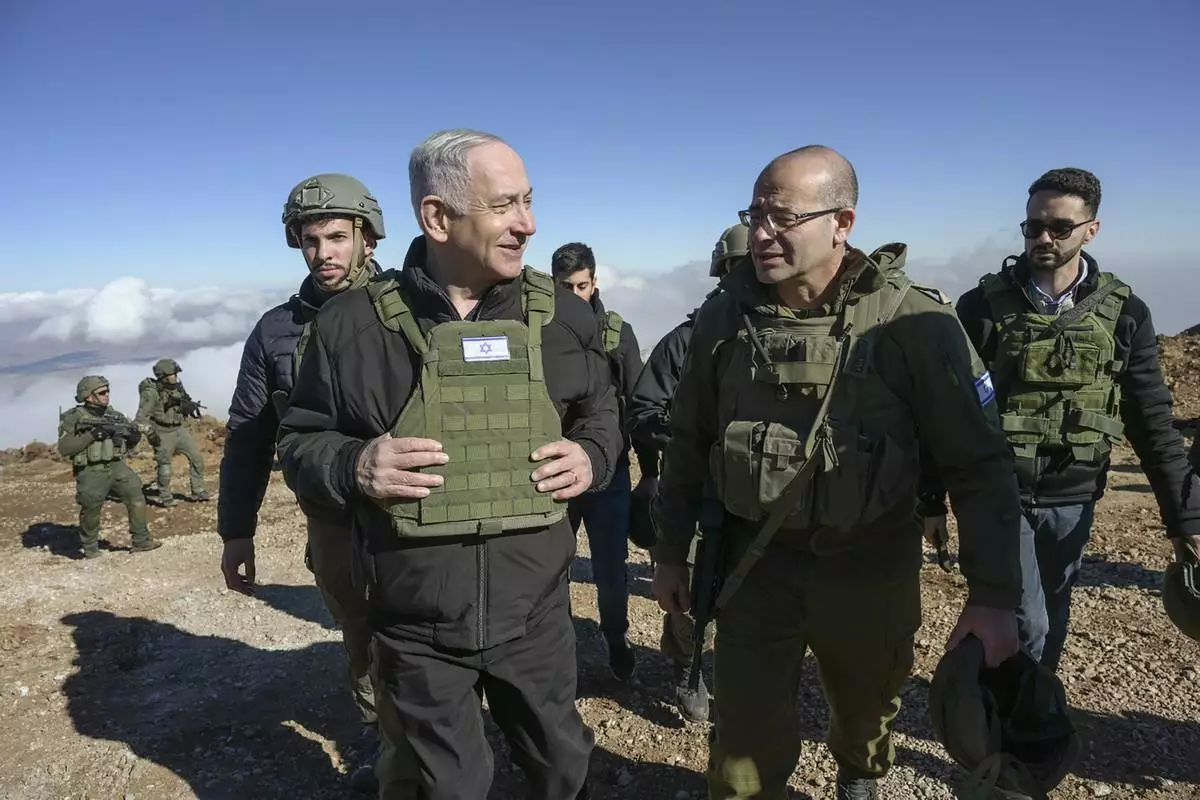
Israel's Prime Minister Benjamin Netanyahu, left, visits Israeli forces in a buffer zone inside Syria, Tuesday, Dec. 17, 2024. (Israel Government Press Office via AP)
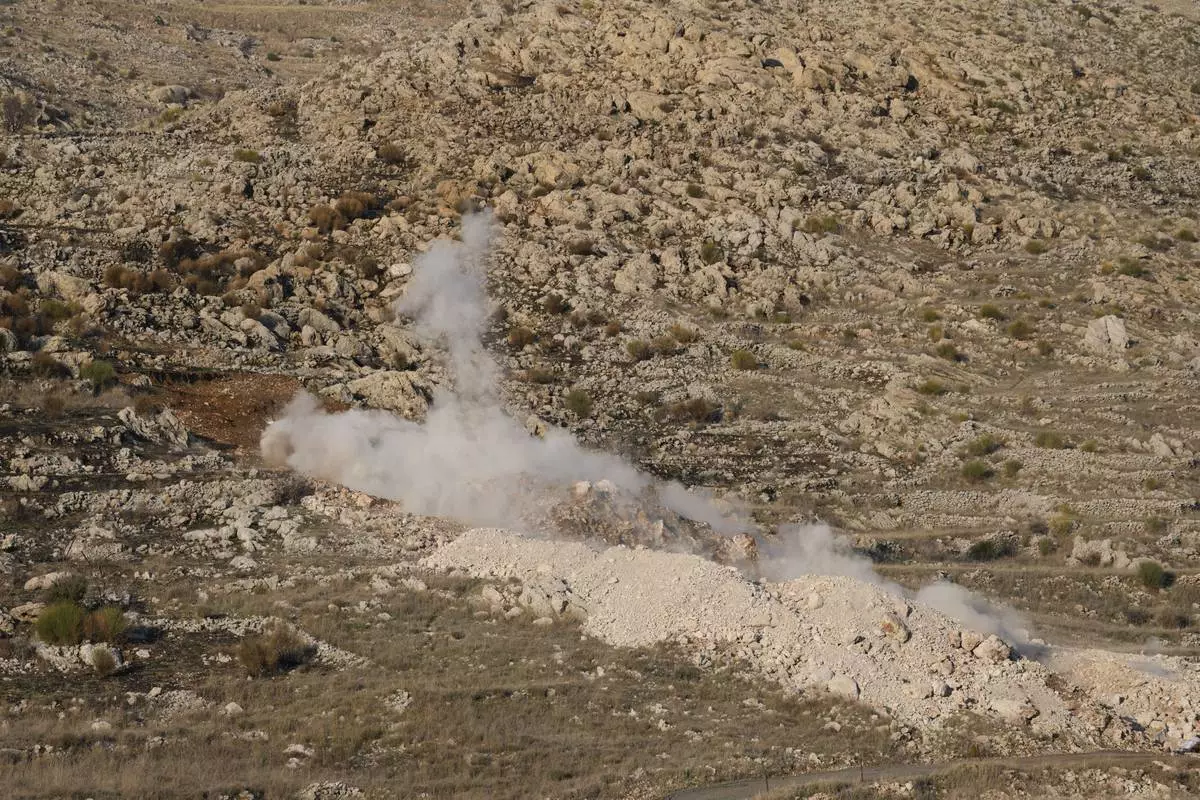
Smoke rises from a controlled explosion inside the buffer zone near the so-called Alpha Line that separates the Israeli-controlled Golan Heights from Syria, in Majdal Shams, Tuesday, Dec. 17, 2024. (AP Photo/Matias Delacroix)
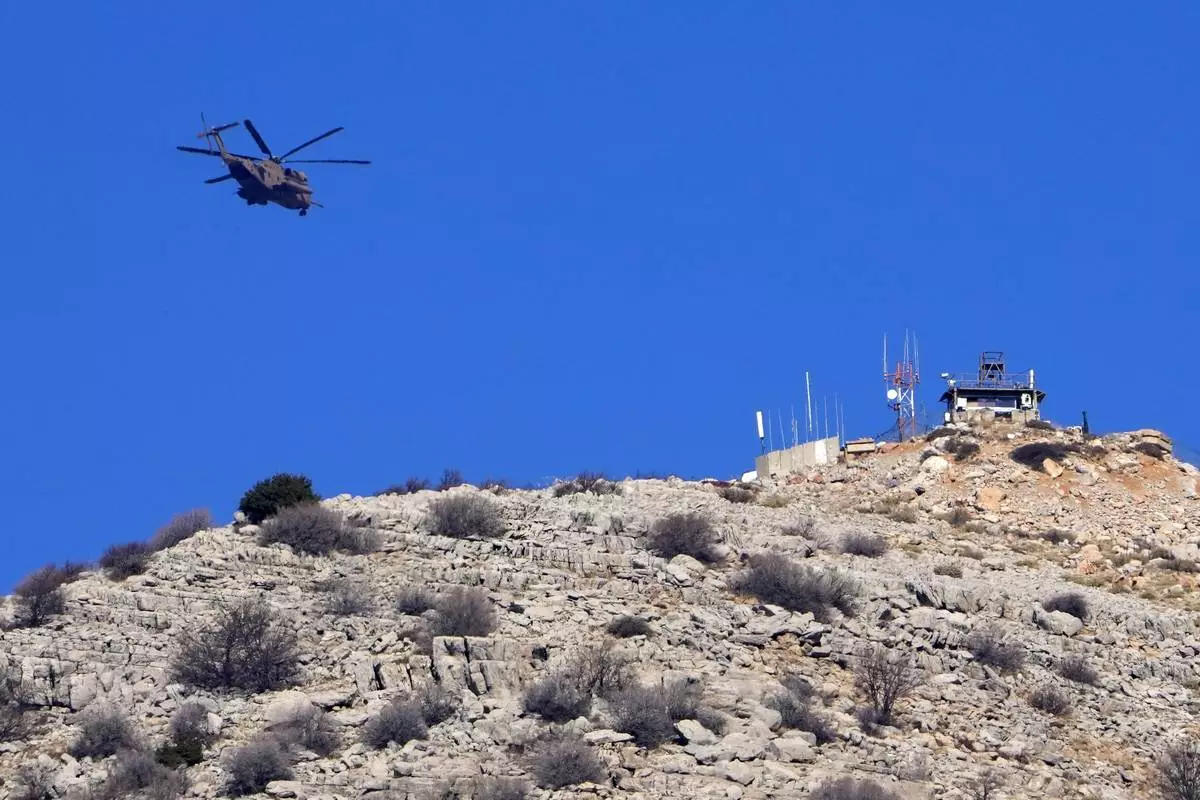
An Israeli Air Force Black Hawk helicopter flies over Mount Hermon, near the so-called Alpha Line that separates the Israeli-controlled Golan Heights from Syria, viewed from the town of Majdal Shams, Tuesday, Dec. 17, 2024. (AP Photo/Matias Delacroix)
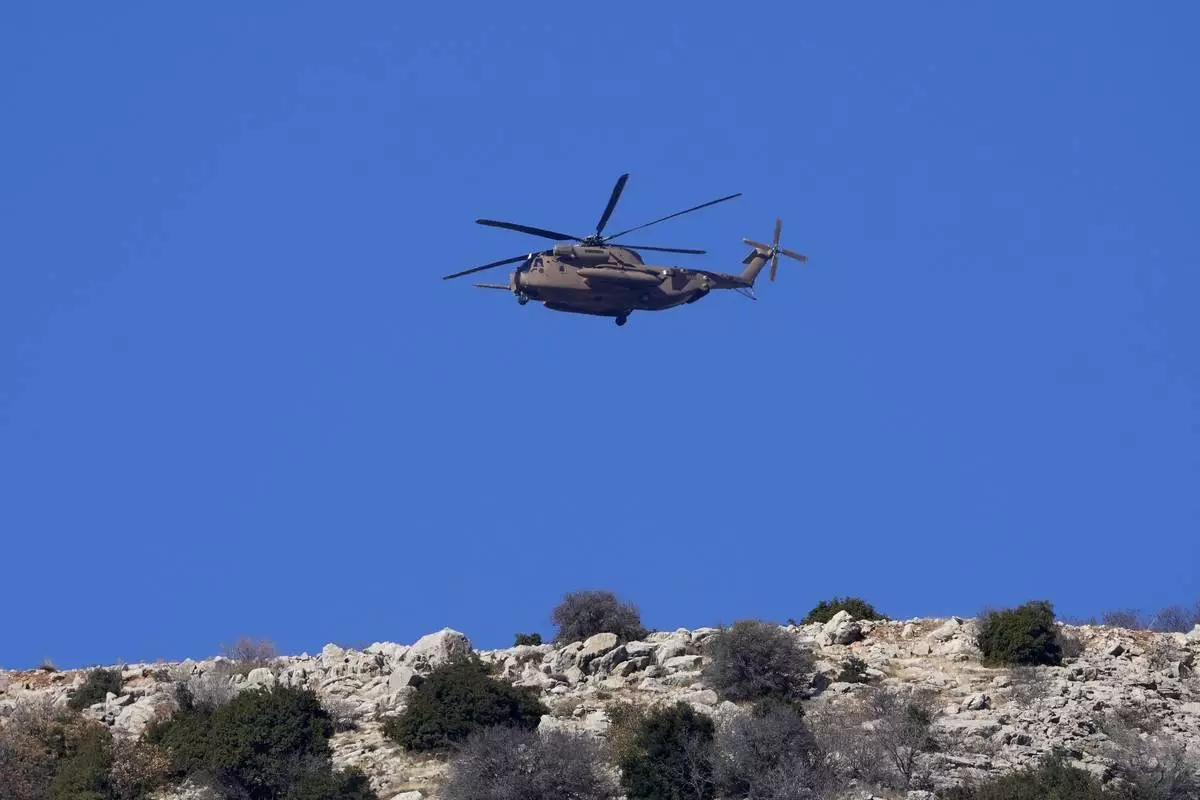
An Israeli Air Force Black Hawk helicopter flies over Mount Hermon near the so-called Alpha Line that separates the Israeli-controlled Golan Heights from Syria, viewed from the town of Majdal Shams, Tuesday, Dec. 17, 2024. (AP Photo/Matias Delacroix)
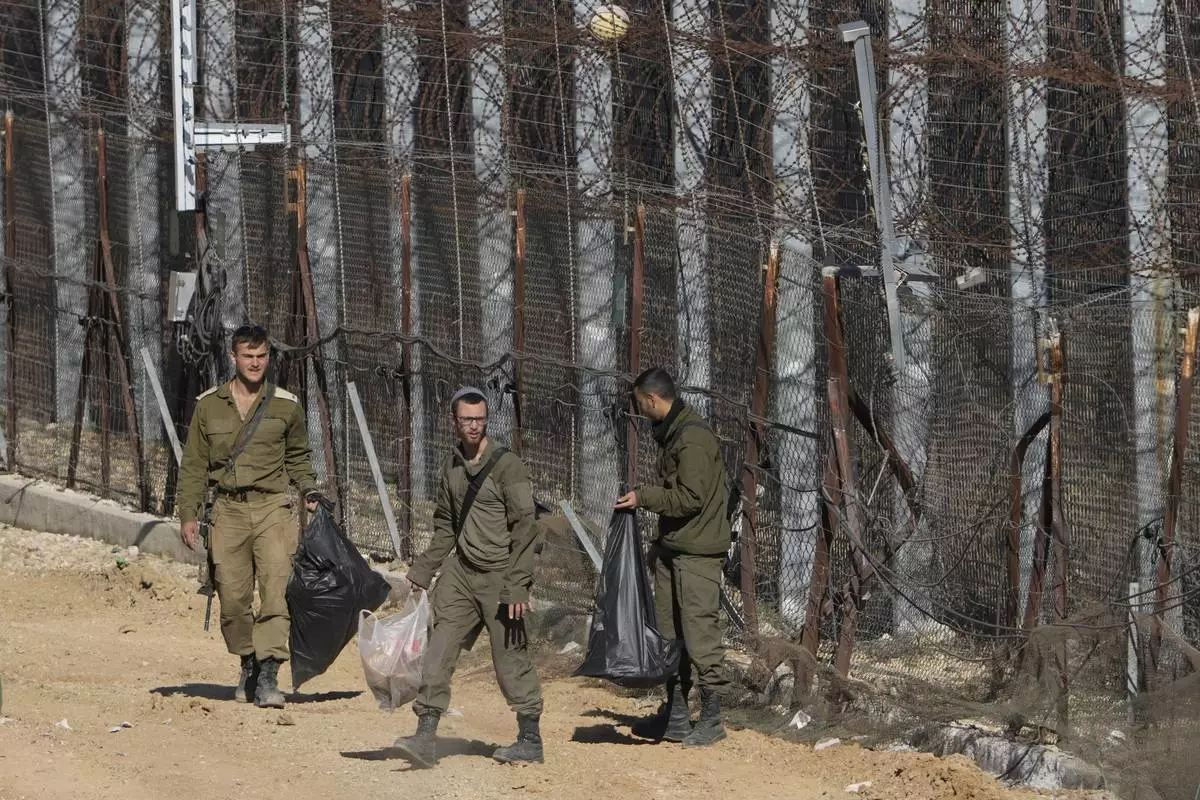
Israeli soldiers clean along the so-called Alpha Line that separates the Israeli-controlled Golan Heights from Syria, in the town of Majdal Shams, Tuesday, Dec. 17, 2024. (AP Photo/Matias Delacroix)
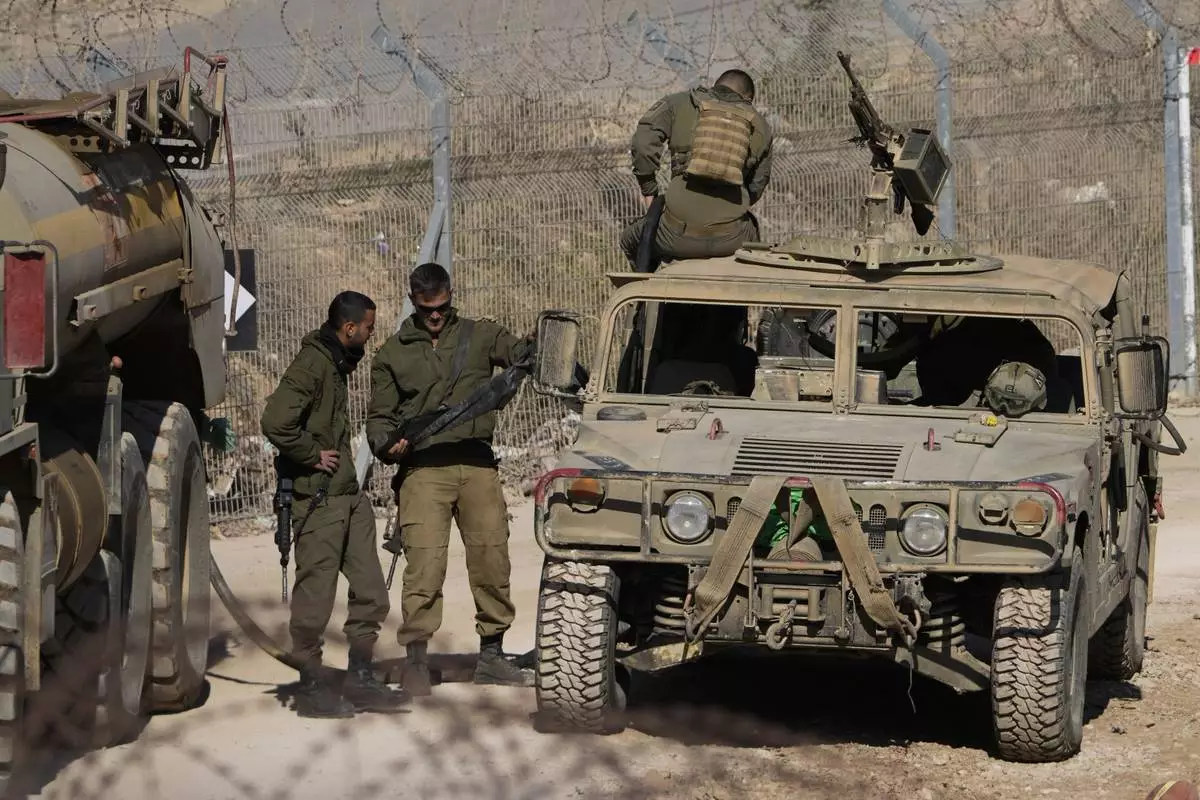
Israeli soldiers stand next to armoured vehicles after crossing the security fence, near the so-called Alpha Line that separates the Israeli-controlled Golan Heights from Syria, in the town of Majdal Shams, Tuesday, Dec. 17, 2024. (AP Photo/Matias Delacroix)
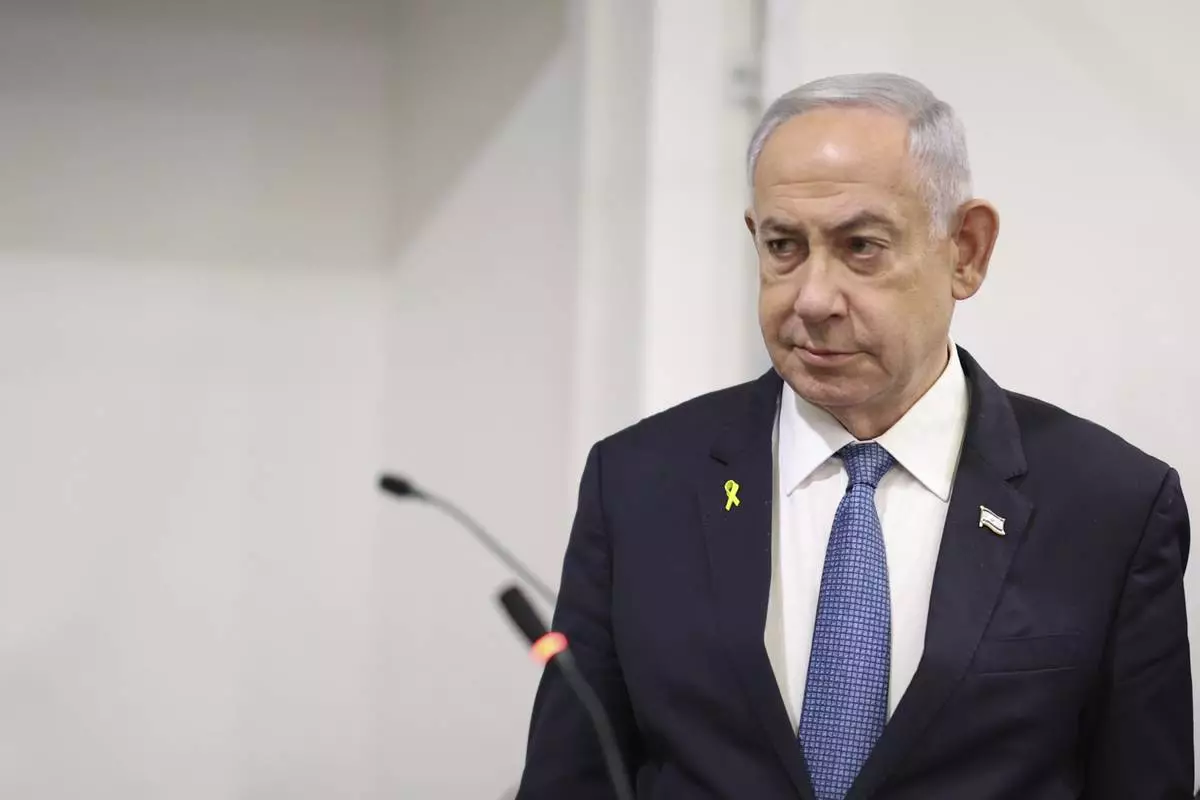
Israeli Prime Minister Benjamin Netanyahu attends his trial on corruption charges at the district court in Tel Aviv, Israel, Monday, Dec. 16, 2024. (Stoyan Nenov/Pool Photo via AP)
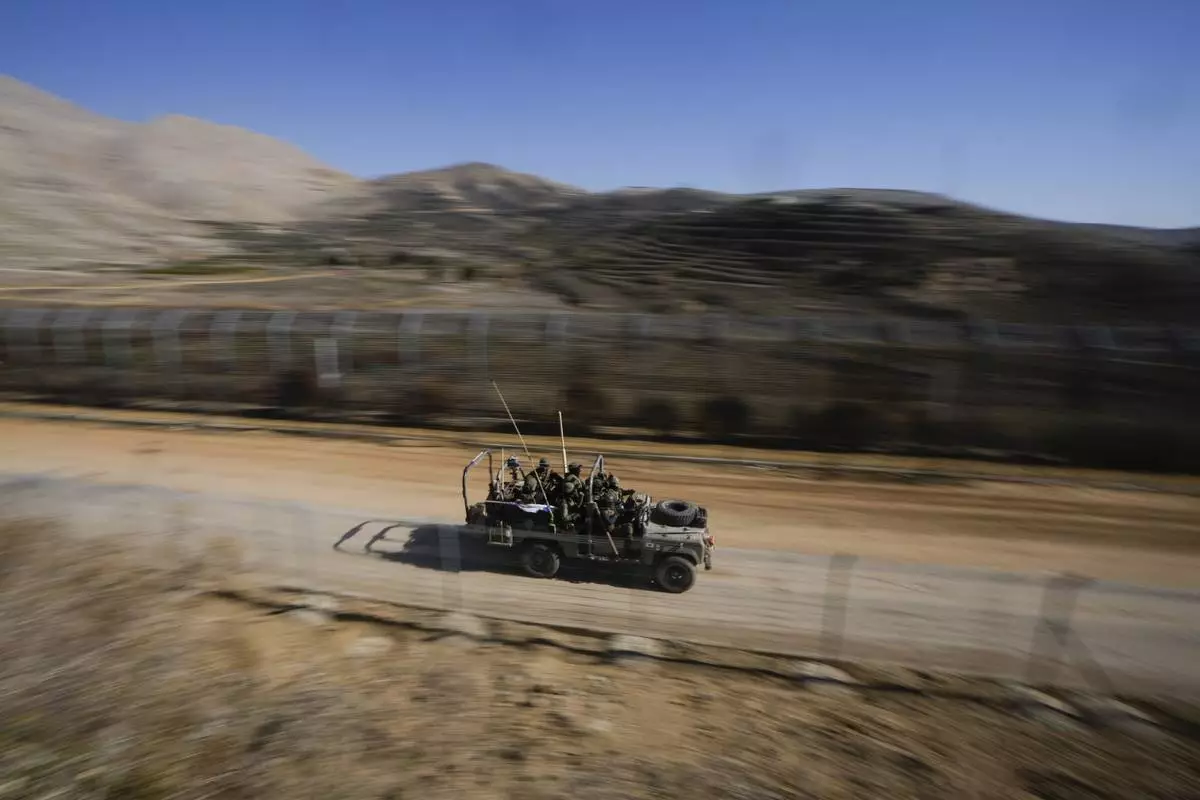
Israeli soldiers stand on an armoured vehicle after crossing the security fence along the so-called Alpha Line that separates the Israeli-controlled Golan Heights from Syria, in the town of Majdal Shams, Tuesday, Dec. 17, 2024. (AP Photo/Matias Delacroix)
The Israeli military on Wednesday ordered another evacuation in central Gaza ahead of an offensive in the area, even as Israel and the militant group Hamas appeared to inch closer to a ceasefire in the 14-month war.
“This is an advance warning ahead of an offensive,” Israeli military spokesman Avichay Adraee posted on X. The order included four residential block areas in the urban refugee camp of Bureij, where Adraee claimed that Palestinian militants fired rockets toward Israel.
He asked the residents to move to a “humanitarian zone” in the Muwasi area. The Israeli media have issued frequent evacuation orders for different parts of Gaza throughout the war, displacing more than 90% of the population, most of them multiple times.
Israeli President Isaac Herzog said he will meet Wednesday with U.S. President-elect Donald Trump's Mideast envoy, Adam Boehler, at his home in Jerusalem. Boehler, a former aid to Jared Kushner, met with Prime Minister Benjamin Netanyahu earlier this week.
Talks to broker the ceasefire and hostage release deal have restarted after a monthslong pause. The deal on the table includes a six week pause in fighting in which Hamas would release 30 hostages, including three of four dual Israeli-U.S. citizens, in exchange for Israel releasing hundreds of Palestinian prisoners. Trump has said he wants a quick end to the war.
Israeli bombardment and offensives in Gaza have killed more than 45,000 Palestinians over the past 14 months, according to the Gaza Health Ministry. The ministry’s tally does not distinguish between combatants and civilians, but it says more than of half the dead were women and children.
Israel launched its campaign in retaliation for Hamas’ October 2023 attack on southern Israel in which militants killed some 1,200 people and abducted 250 others, around 100 of whom remain in captivity.
Here’s the latest:
TEL AVIV, Israel — Prime Minister Benjamin Netanyahu took the stand on the fourth day of testimony in his corruption trials Wednesday, saying the accusations against him are “idiotic.”
Netanyahu, the first sitting Israeli leader to take the stand as a criminal defendant, is on trial on charges of fraud, breach of trust and accepting bribes in three separate cases.
Netanyahu was supposed to testify on Tuesday, but it was canceled after he requested a postponement due to “security reasons.”
Netanyahu toured the summit of Mount Hermon, part of the Syrian buffer zone that Israeli forces seized after President Bashar Assad was ousted by rebels last week. It appeared to be the first time an Israeli leader had set foot that far into Syria.
The testimony, set to take place six hours a day, three days a week for several weeks, will take up a significant chunk of Netanyahu’s working hours, prompting critics to ask if he can capably manage a country embroiled in a war on one front, containing the fallout from a second, and keeping tabs on other potential regional threats, including from Iran.
DAMASCUS, Syria — The Damascus airport reopened Wednesday for the first time since the fall of the government of Bashar Assad, and the first civilian plane took off from Damascus and landed in the northern city of Aleppo.
The airport is currently open only to domestic flights, but Syrian airspace is open to international traffic.
Airport officials have not yet specified when international flights will resume at the Damascus airport, but Saad Khair Bec, technical supervisor, called Wednesday’s reopening “an important day in the life of the Syrian people ... after the fall of the former shabby regime.”
State institutions have been gradually returning to work in recent days, including the main port in the coastal city of Latakia.
GENEVA — The head of the U.N. migration agency said she was reassured by commitments she heard from Syria’s new caretaker government in meetings in Damascus, as the country seeks to rebuild after more than a half-century of rule under the Assad family.
Amy Pope, director-general of the International Organization for Migration, said in a phone interview Wednesday that Syria’s new leaders “recognize the job they have ahead of them is enormous and that they need the support of the international community.”
IOM estimates about 100,000 people — many looking to return to their former homes — have entered Syria from neighboring countries since Dec. 8, the day former President Bashar Assad fled the country as opposition fighters swarmed into the capital.
“We are also seeing about 85,000 people come out” into Lebanon through established border crossing points, she said. “It’s a rough figure: There’s certainly people who cross informally and so they’re not counted.”
Most of those found to be leaving are Shiite Muslims, she said. The armed groups who took control of Syria are primarily from the country’s majority Sunni Muslim community, including Hayat Tahrir al-Sham, the terrorist-designated group that led the coalition of armed opposition groups that drove Assad from power and into asylum in Russia.
“There’s no question to me that at this moment in time, they are looking for ways to make this work, to be more inclusive, to build partnerships across the international community, to build partnerships with other governments,” Pope said of the caretaker government. “It’s just going to be a question of whether they can deliver.”
IOM said Pope was one of the first heads of a U.N. agency to visit Syria since Assad’s ouster, and she met with unspecified members of the caretaker government on Tuesday, as well as U.N. officials and advocacy groups.
She reaffirmed the IOM's commitment to Syria. The organization has been providing assistance to people in the country since 2014 and is seeking $30 million in urgent aid funding for the next four months to try to help nearly 685,000 people in the northwest of the country.
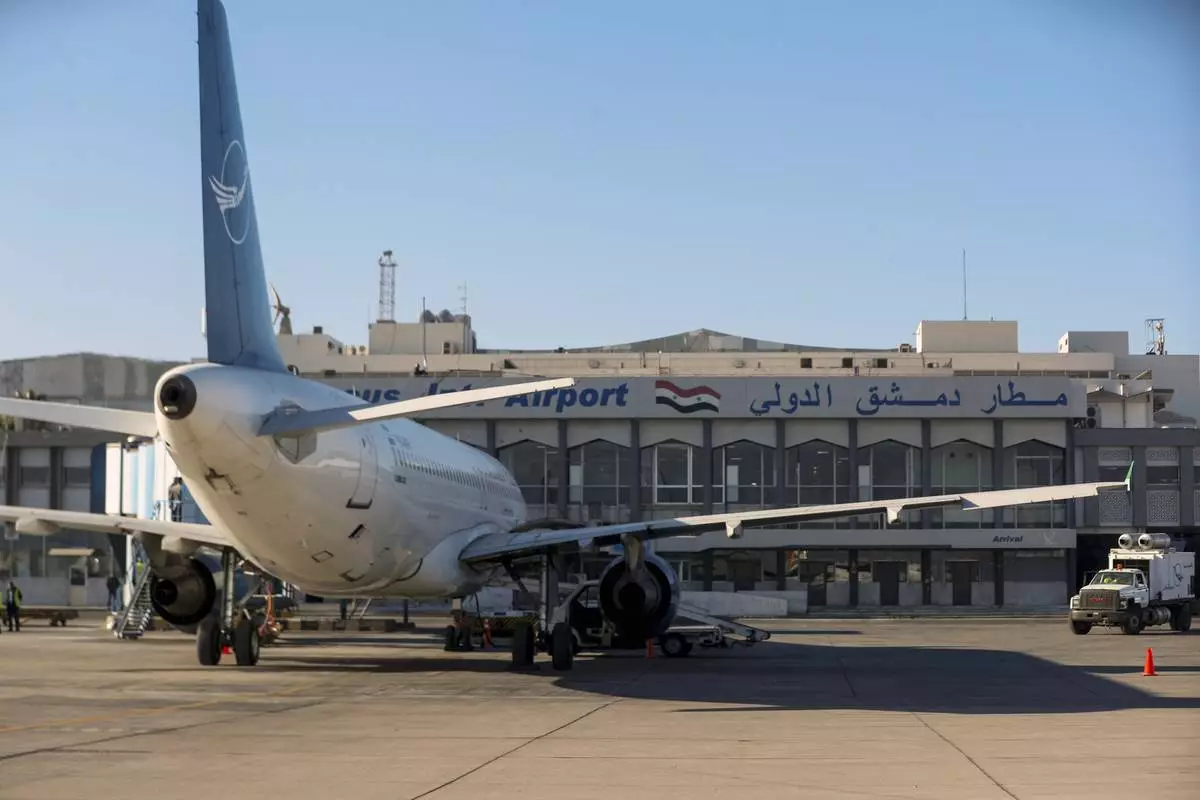
A Syrian Air airplane is seen parked at the terminal as the airport reopens for internal flights in Damascus, Syria, Wednesday, Dec. 18, 2024. (AP Photo/Omar Sanadiki)

A man with a Syrian "revolutionary" flag sits inside a Syrian Air airplane ahead of take-off as the airport reopens for internal flights in Damascus, Syria, Wednesday, Dec. 18, 2024. (AP Photo/Omar Sanadiki)
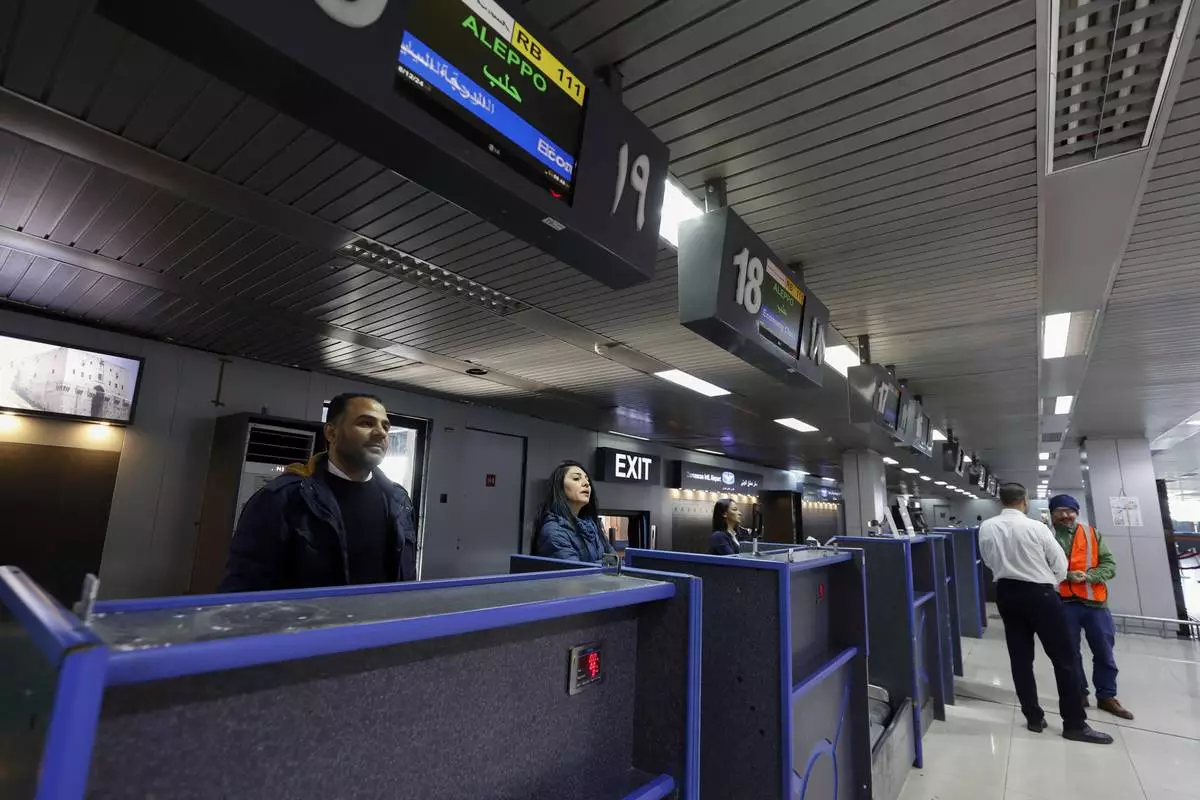
Employees stand at check-in counters as the airport reopens for domestic flights in Damascus, Syria, Wednesday, Dec. 18, 2024. (AP Photo/Omar Sanadiki)
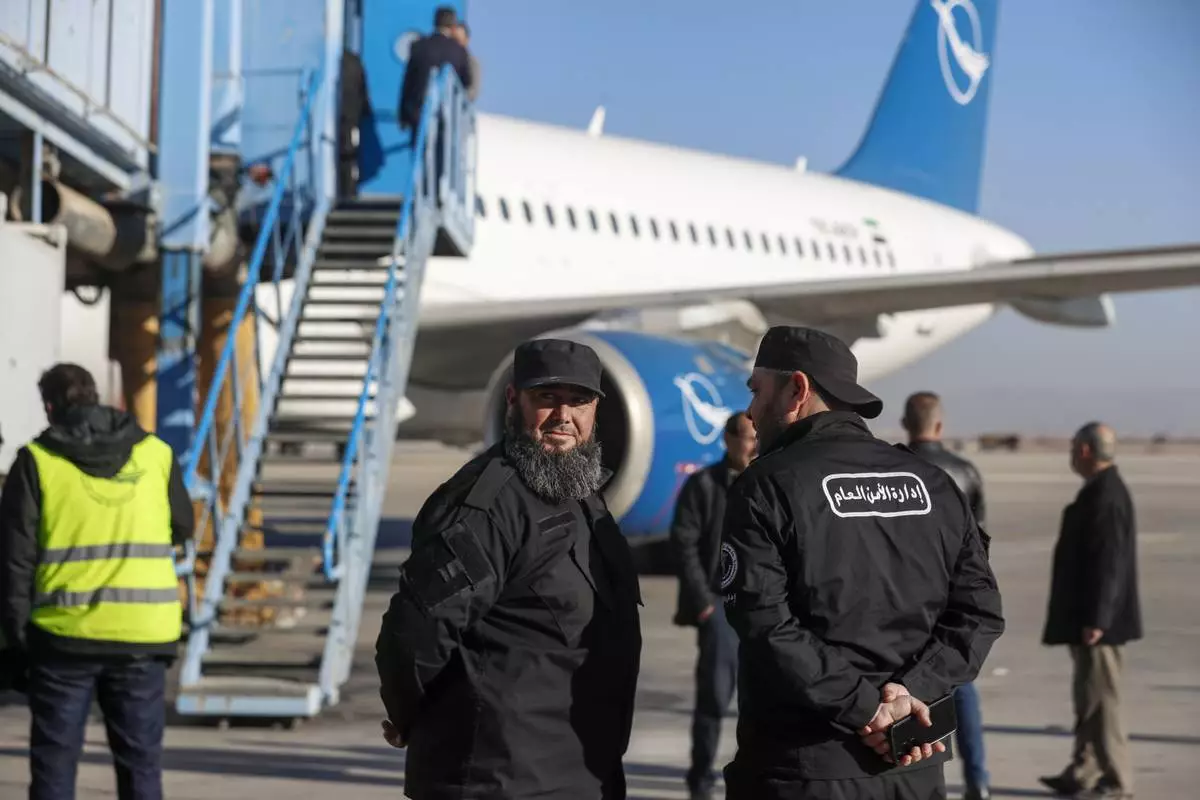
General Security personnel stand next to a Syrian Air airplane ahead of take-off as the airport reopens for internal flights in Damascus, Syria, Wednesday, Dec. 18, 2024. (AP Photo/Omar Sanadiki)
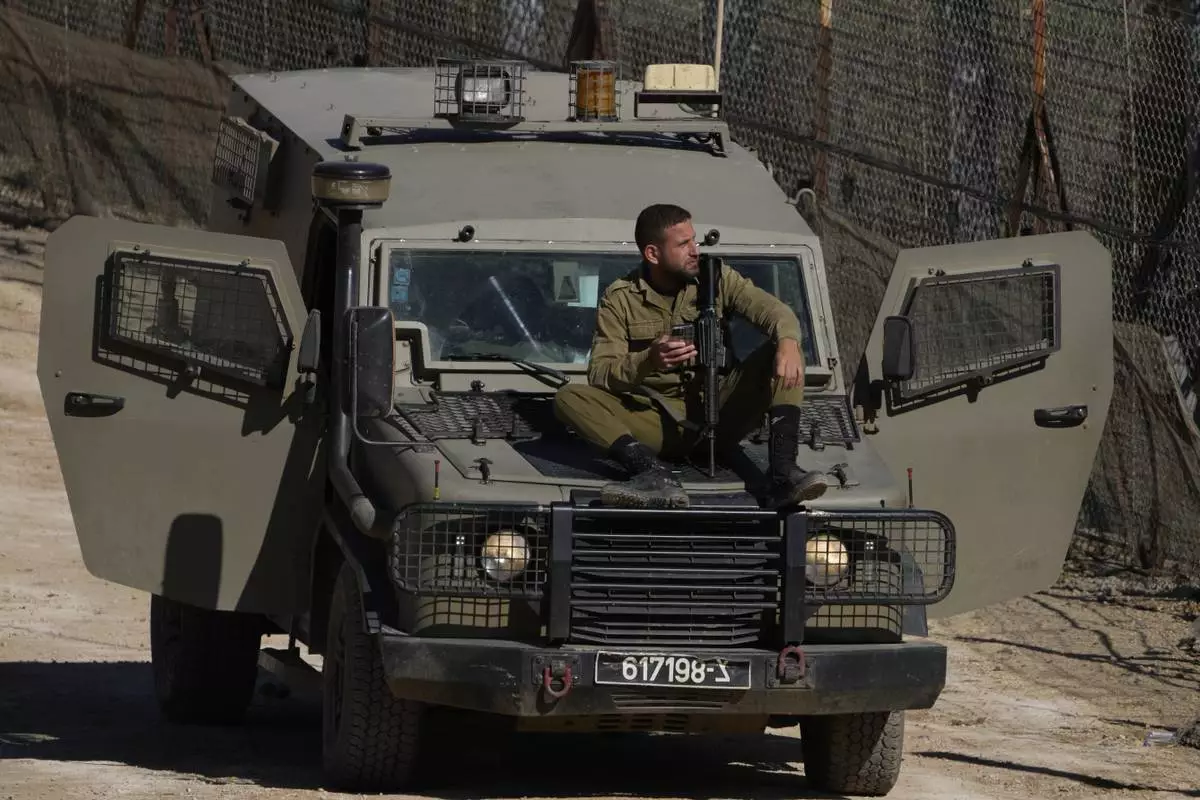
An Israeli soldier sits on an armoured vehicle next to security fence near the so-called Alpha Line that separates the Israeli-controlled Golan Heights from Syria, in the town of Majdal Shams, Wednesday, Dec. 18, 2024. (AP Photo/Matias Delacroix)
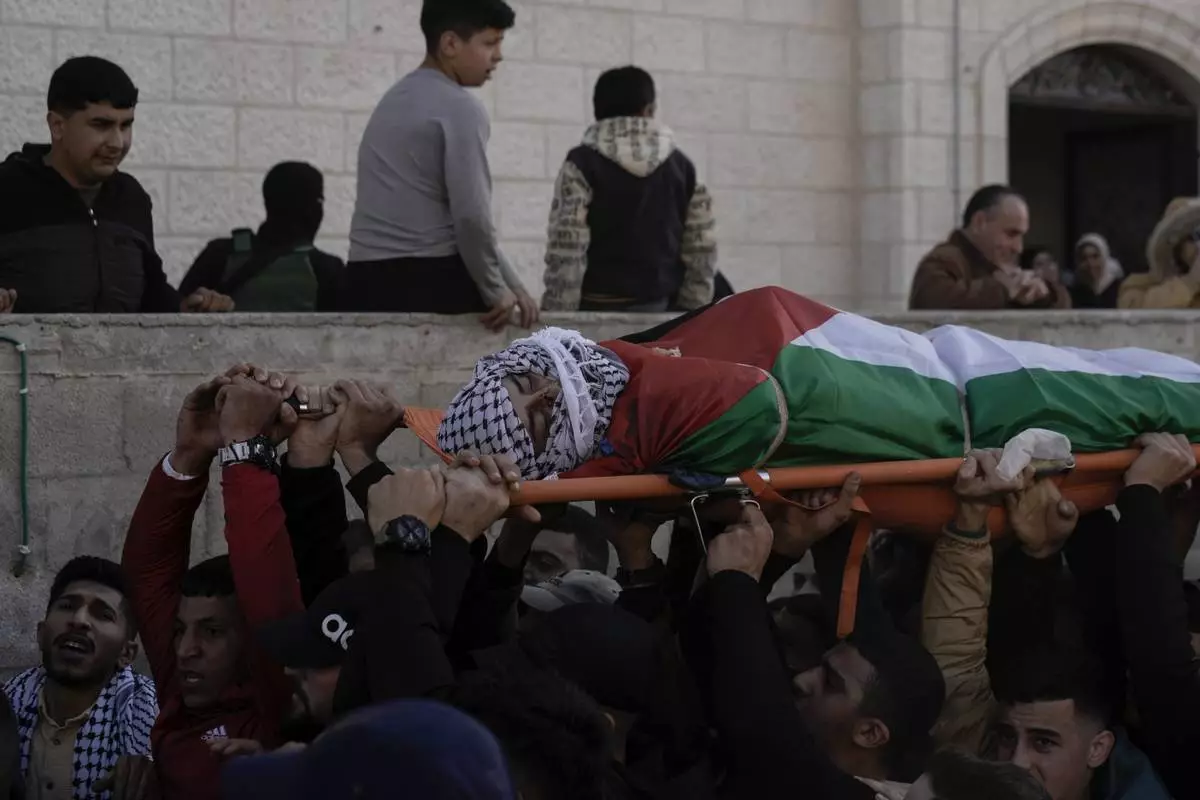
Palestinian mourners carry the body of Mohammed Abu Kishk, who was killed in clashes with Israeli forces during his funeral at the Askar refugee camp in the Israeli-occupied West Bank, Dec. 17, 2024 (AP Photo/Majdi Mohammed).
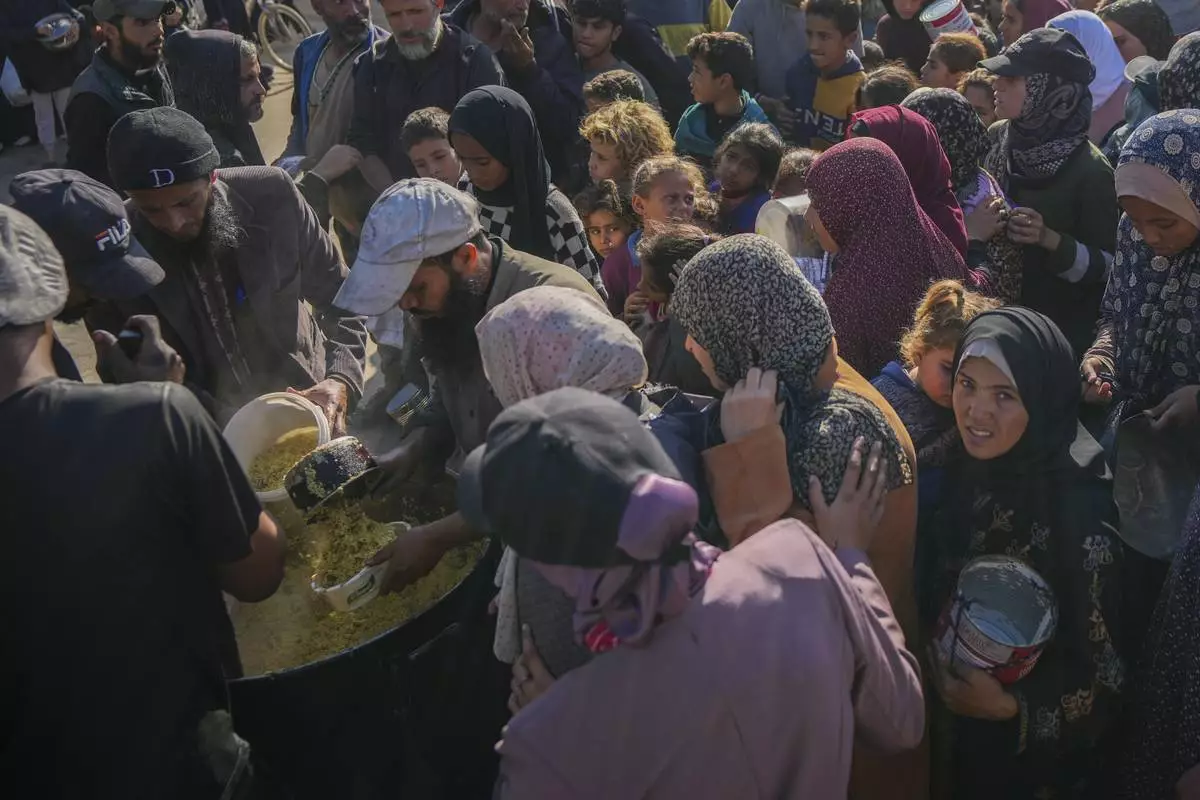
Palestinians gather to get donated food at a distribution center in Deir al-Balah, Gaza Strip, Tuesday, Dec. 17, 2024. (AP Photo/Abdel Kareem Hana)
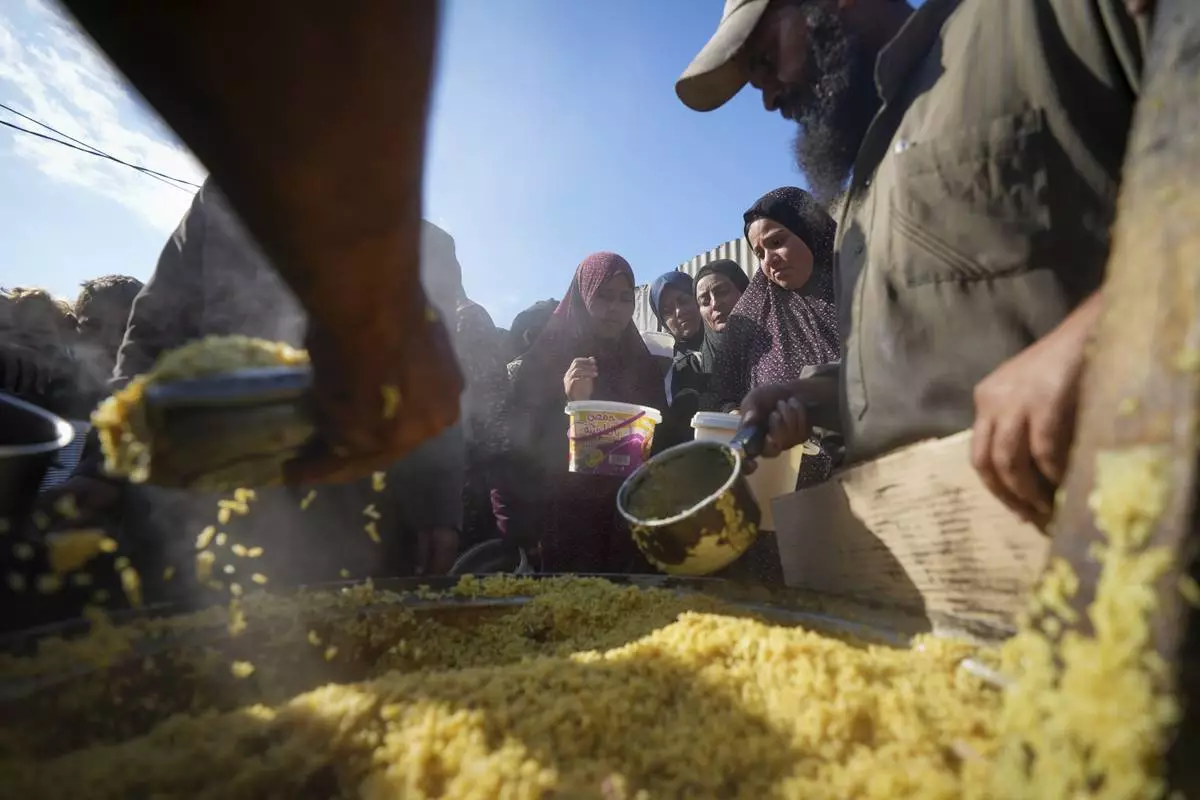
Palestinian women wait to receive food at a distribution center in Deir al-Balah, Gaza Strip, Tuesday, Dec. 17, 2024. (AP Photo/Abdel Kareem Hana)
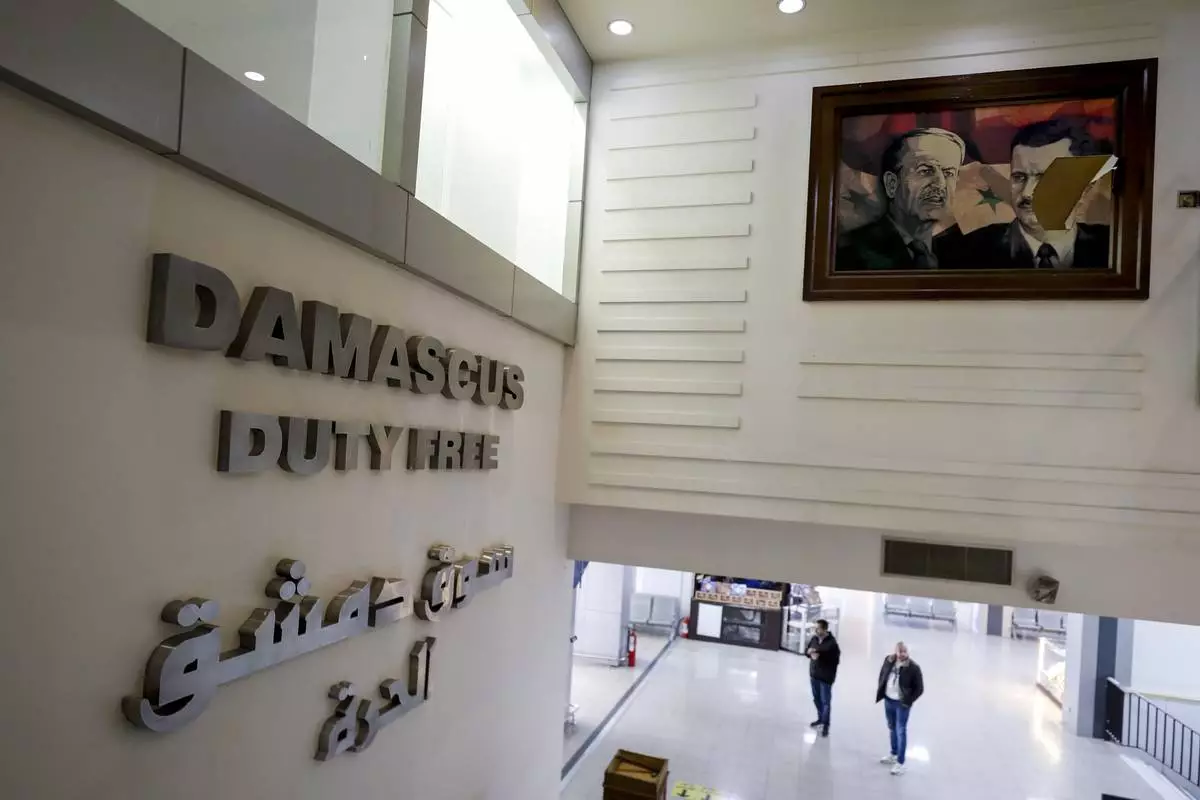
A torn picture of ousted Syrian President Bashar Assad, right, and his late father, President Hafez Assad, is seen attached at the Duty Free of the Damascus airport, Syria, Wednesday, Dec. 18, 2024. (AP Photo/Omar Sanadiki)










